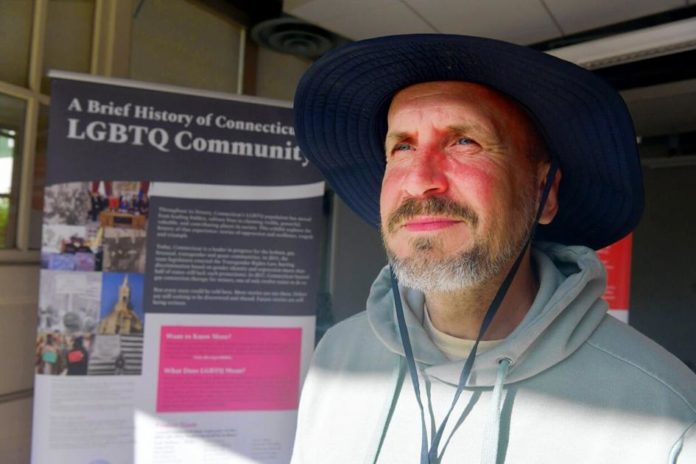
Connecticut’s progressive LGBTQ laws aimed at offering equitable and supportive policies and programs have helped turn the state into a model for others throughout the country.
Aside from the legal protections provided through laws, A-List actors and professional athletes coming out publicly is providing role models for LGBTQ people of all ages to look up to, something that was lacking when state Comptroller Kevin Lembo, 57, came out to his mother as a preteen, before he “came out with a vengeance” around the age of 16.
At that time, “there were very few role models,” Lembo said. “I sometimes joke that our role models on television were always flight attendants, Broadway actors, and serial killers.”
As a self-proclaimed “math and science nerd,” he said, “the climate was not accepting; the climate was hostile. Not just words, but some folks also experienced significant physical assaults as a result.”
Lembo’s mother was most concerned, he said, about him not giving her grandchildren, a concern that was remedied when Lembo and his husband rounded out their family with three sons.
Most recently, state lawmakers passed a law that ensures all children have equal access to a legal parent-child relationship, regardless of their parents’ sexual orientation or gender.
The new law, signed by Gov. Ned Lamont last month, also aims to ensure that children have the same protection that legal parentage provides by making it easier to establish parentage at birth, regardless of whether the child is born to married parents.
Rep. Jeffrey Currey, D-East Hartford, who is openly gay, has played an instrumental role in passing various pieces of legislation aimed at protecting the LGBTQ community.
Lamont mentioned Currey specifically when signing the parentage bill into law.
“I particularly want to thank state Representative Jeff Currey of East Hartford for shining a light on the unequal ways the law has continued to treat different-sex parents and same-sex parents, and helping lead a coalition that advanced this legislation to my desk,” Lamont said in a written statement. “Any day that we can expand equal protection for all individuals is a good day.”
He added that the most recent law shows that “Connecticut has been at the forefront of so many LGBT issues.”
Importance of support
Currey, 41, came out to his mother 20 years ago, when his parents sent him on a trip to Las Vegas not initially knowing he was going to see his boyfriend who was taking part in a production of “Footloose.”
When his mother asked who he was going to stay with, “I said, ‘My boyfriend; I’m gay,’” Currey said. “My mother, without missing a beat, said, ‘Are you sure?’ I said, ‘Yes,’ and that was the end of that.”
Currey credited his supportive family and friends for his relative ease when coming out, saying there wasn’t any “sticker shock.”
“I have had the privilege of having those supports in place all along the way,” he said. “If something did go sideways, I had the right people to speak with.”
However, young people now have a resource Currey didn’t have while in school — Gender and Sexuality Alliances, formerly known as Gay Straight Alliances.
Because of inclusive groups and education, Currey said his 16-year-old nephew and his peers are more accepting of their transgender classmates who are open and conversational about their lives.
“When we start having conversations at that age level, it normalizes my community and my tribe,” he said.
The state’s progressive LGBTQ laws played a role in Lembo and his husband choosing to live in Connecticut.
“We chose Connecticut for a number of reasons, including the values that we believed existed here based on the laws that had been passed, and we found that to be true once we arrived,” Lembo said. “I think Connecticut has done an amazing job.”
In 2010, Lembo became the first openly gay person in state history to be elected to statewide office.
The state’s LGBTQ laws are routinely passed with large bipartisan support, which Lembo said is made easier when there are LGBTQ lawmakers within the General Assembly.
Former Rep. Joseph Grabarz, D-Bridgeport, became the first openly gay legislator in state history, coming out publicly during a press conference in 1990.
“That was a big moment at a time when it was a scary proposition to do so, but then everybody (in the legislature) knew someone” who was gay, Lembo said.
Over the years, lawmakers have been able to drum up bipartisan support for many pieces of LGBTQ legislation from laws supporting transgender inmates to abolishing the panic defense.
“I’m extremely pleased that we’ve been able to work in a bipartisan manner to come at these together and it hasn’t solely been the LGBTQ members,” Currey said. “People on both sides of the aisle have been tremendous.”
Connecticut is the first state in the nation to have an LGBT Health and Human Services network, with funding of $500,000 in each of the previous two biennial state budgets. It also has expanded the definition of “family” in the Paid Family Medical Leave program, required LGBTQ curriculum, reinstated benefits for veterans discharged due to “Don’t Ask, Don’t Tell,” and made it easier for minors to access the HIV preventive medication PrEP.
Preventing horror stories
Young people need to know they can be supported by people they trust, rather than being told there is something wrong with them or being told they will burn for eternity for their sexual orientation or gender identity, Lembo said.
The state also has made strides to protect young LGBTQ people from theological or medical ghost stories.
In 2017, a bill also led by Currey and signed into law by former Gov. Dannel P. Malloy, outlawed so-called conversion therapy for minors. The practice of conversion therapy attempts to change a person’s sexual orientation or gender identity, sometimes through the use of electric shocks.
The law made it impermissible for licensed health care professionals to practice conversion therapy, and those who do are subject to discipline by the Department of Public Health. Anyone who is subjected to the technique is able to bring a claim under the Connecticut Unfair Trade Practices Act, and state funds are prohibited from being used for conversion therapy.
During debate on the bill, several members of the General Assembly cited statistics that show those who have been subjected to conversion therapy were eight times more likely to attempt suicide.
Lembo noted that suicide attempts are drastically more common among young LGBTQ people of color.
According to the Trevor Project, a suicide prevention organization, 36% of LGBTQ youths who are also people of color have attempted suicide, while 7% of LGBTQ young people who are not people of color have tried to end their own life.
Lembo opined that minorities have faced discrimination for generations, and adding an LGBTQ member to the community could only cement a feeling of exclusion.
“We can’t underestimate a psychic damage when you are the brunt of discrimination,” he said, adding that there is a wrong assumption that gays and lesbians automatically accept other members of the LGBTQ community. “We need to do more work in the community to make sure that everyone is welcome.”
“A lot comes down to the hate and vitriol that these young people see,” Currey said, adding that the “level of hate and misunderstanding people have for trans athletes essentially told an entire population of our kids that they aren’t worthy.”
As for the future, advocates agree the focus should be on young adults and children through educational and supportive programs.
Linda Estabrook, executive director of the Hartford Gay and Lesbian Health Collective is hopeful lawmakers “maintain a constant awareness,” and ramp up funding for LGBTQ organizations.
“There’s a small number of LGBT-focused organizations in the state,” she said. “There are tremendous funding needs to maintain and even enhance current programs and services.”
Meanwhile, Manchester’s Department of Leisure, Family, and Recreation is highlighting the long and largely unknown LGBTQ history in Connecticut.
The eight-banner exhibit on loan from the Connecticut Historical Society is on display every Wednesday at the Spruce Street Farmers Market through July.
James Przybylski, supervisor of the Division of Neighborhoods and Families, said the state’s LGBTQ history, which dates back to the at least the 1600s, is often lost and local officials are trying to raise awareness.
“Pride Month is every month,” he said. “Queer history is Connecticut history.”
The exhibit features various historic LGBTQ events throughout the state, including Rev. Stephen Gorton, a Baptist minister who was charged with “unchaste behaviour with his fellow men when in bed with them” in 1757.
It goes through a time some would like to forget, such as when the Department of Mental Health decided in 1956 to classify homosexuality as a sociopathic personality disorder. It also takes note of safe havens, such as the Cedar Brook Café in Westport, which opened in 1939 before closing in 2010.
In 1971, the Twenty Club was founded as a support group for transgender people by Canon Jones and Dr. George Higgins, a professor at Trinity College.
‘My relationships with everybody became better’
Christopher Silver, an openly gay lifelong Manchester resident and director of the town’s Department of Leisure, Family, and Recreation, said the changes over time were “obviously for the better.”
Now 54 years old, Silver didn’t tell his parents he was gay until he was 39 out of fear of being ostracized, noting there weren’t the same support systems in schools or society when he was younger.
“I feared physical and emotional harm throughout my whole life,” he said, adding that he didn’t blame his parents for not asking about his sexual orientation, even though they told him they already knew before he came out.
The AIDS epidemic hit the country when he was in his teens, convincing him further to stay closeted out of fear of being rejected entirely by society.
“Your dreams and hopes for the future really were dreams of despair, hopelessness, secrecy, isolation, lies, all of these things you feel bad about but were placed upon you because that’s the way society was,” Silver said.
Finally, a friend asked him point blank if he was gay, and Silver came out for the first time, prompting him to tell others.
Because of “that one moment of acceptance,” “my relationships with everybody became better” because he was being his genuine self, he said.
Silver said he is proud of what Manchester has become.
“I will say with confidence that we are one of the more progressive communities in the state around not just race relations, but sexuality, and gender identification, and all of these things,” he said. “At a government level, an education level, a community level, all groups are working towards the same thing, and that is equity for everybody.”
Likewise, Lembo said, Connecticut is “consistently progressive and welcoming, and I think time will judge us well.”








